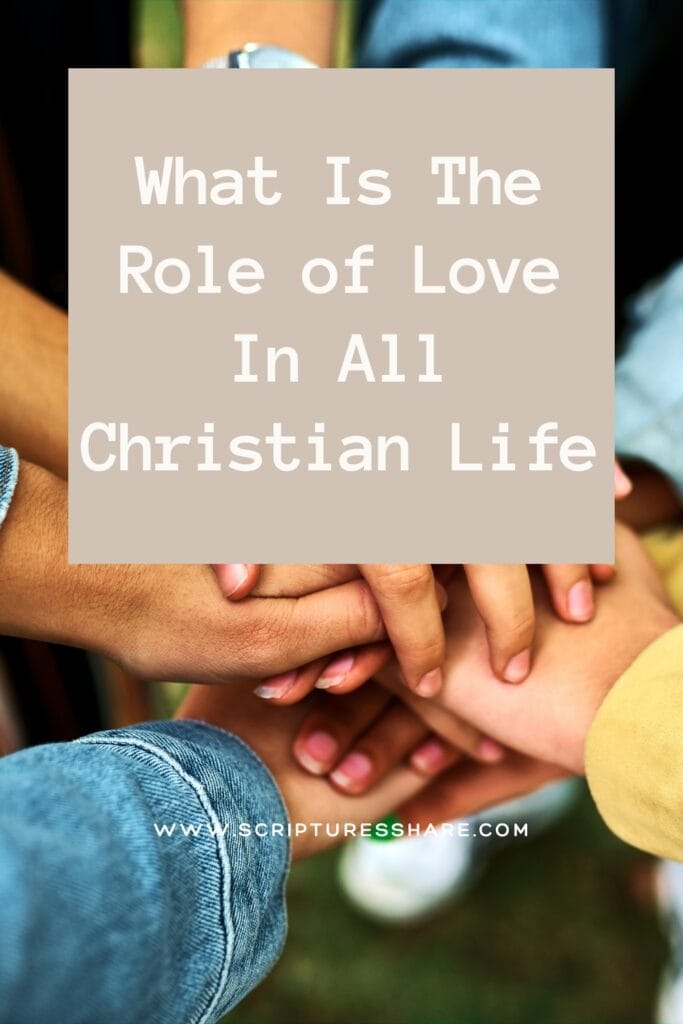No products in the cart.
What Is The Role of Love In All Christian Life
This post contains paid and/or affiliate links. I make a small commission at no extra cost to you. Please see our Privacy Policy.
In Christian life, love is key. It shapes how we treat others. It’s not just a feeling but an action of compassion and kindness.
Understanding love can change our relationships. It makes our bonds with family, friends, and even strangers stronger.
The Biblical Foundation of Love
The Bible teaches a lot about love. 1 Corinthians 13:4-7 says love is patient and kind. It’s free from jealousy and pride. This helps us know how to love every day.
By following these teachings, we can make our relationships better. We can love more deeply.
“Love is not just an emotion; it’s a divine action that reflects God’s heart. In loving others selflessly, we mirror His eternal love.”
Love as a Commandment
In Christianity, loving others is a command. Jesus said to love our neighbors as ourselves (Mark 12:31). This means seeing others with compassion and understanding.
ADVERTISEMENT
Following this, we build strong connections. These connections are based on respect and care.
Types of Love in Christian Life
There are different kinds of love:
- Agape Love: This is selfless, unconditional love. It shows God’s love for us and tells us to love others without expecting anything back.
- Philia Love: This is the love between friends. It’s about loyalty, companionship, and respect, which are important for good relationships.
- Eros Love: This is about romantic love. It invites Christians to show affection and intimacy in a healthy way.

Impact of Love on Relationships
Love makes relationships better in many ways:
- Strengthened Bonds: Love creates deeper connections. It builds trust and security.
- Conflict Resolution: Love helps us forgive and understand each other. This makes conflicts easier to solve.
- Support and Encouragement: Loving relationships give emotional support. They help us grow and face challenges together.
Practicing Love in Everyday Life
Showing love in our daily actions can change lives. Here are some ways to do it:
- Act with Kindness: Small acts of kindness can make a big difference. Helping others or giving compliments can brighten someone’s day.
- Listen Actively: Paying attention to others shows you value their thoughts and feelings. It’s a powerful way to show love.
- Offer Your Time: Spending time with loved ones and friends strengthens relationships. It builds bonds.
Challenges in Expressing Love
It’s not always easy to show love. Personal struggles and past hurts can make it hard. But, by praying and reflecting, we can overcome these challenges.
The Community Aspect of Love
Love is important in communities too. A loving community is accepting and supportive. It’s a place where everyone feels valued and included.
Love and Spiritual Growth
Practicing love helps us grow spiritually. As we show love, we get closer to God. This deepens our understanding of life and our faith.
Love is the heart of Christian life. It changes our relationships and the world around us. By loving, we make a difference in the lives of others.
“Christian love transforms relationships, deepens bonds, and creates a life filled with kindness, patience, and understanding.”
Love as a Central Theme in Christian Teachings and Scriptures
Love is at the core of Christian teachings. It deeply influences believers and their connection with God and each other. In Christianity, love is the foundation of all virtues. It’s not just a feeling but an action of compassion and service.
The Nature of Divine Love
Christian belief centers on God being love. This is shown in 1 John 4:8, which says, “Whoever does not know love does not know God, because God is love.” This verse shows love is key to God’s nature. When Christians show love, they show God’s love to the world.
Love in the Teachings of Jesus
Jesus Christ, the heart of Christianity, taught about love. In Matthew 22:37-39, He said, “Love the Lord your God with all your heart and with all your soul and with all your mind. This is the first and greatest commandment. And the second is like it: ‘Love your neighbor as yourself.'”
He taught that loving God and loving others go hand in hand. This guides believers to live with kindness and compassion.
The Role of Love in Community
Christianity says love is key to community. In the Church, love brings unity and support. Here’s how love works in Christian communities:
ADVERTISEMENT
- Fellowship: Real connections form as believers share joys and sorrows.
- Service: Love motivates believers to help others and serve their communities.
- Forgiveness: Love helps Christians forgive, healing relationships.
The Importance of Selfless Love
Selflessness is a big part of love in Christianity. The Bible urges us to put others first. Philippians 2:3-4 says, “Do nothing out of selfish ambition or vain conceit. Instead, in humility value others above yourselves, looking out not only for your own interests but also for the interests of others.”
This selfless love can change lives. It inspires acts of kindness that improve communities.
Love in Action: Practical Examples
Christians can show love in many ways:
- Practicing Kindness: Small acts like greeting neighbors or volunteering show love.
- Listening: Listening to others shows they matter.
- Encouragement: Words of encouragement uplift and value others.
- Building Relationships: Spending time with loved ones strengthens bonds.
These actions are more than duties. They are expressions of love that can inspire others.
Love as a Transformative Force
Love is truly transformative. It can change hearts and heal wounds. When Christians show love, they reflect God’s character and create a caring community. 1 Corinthians 13:4-7 describes love as patient and kind, encouraging believers to live these qualities.
Love is central to a fulfilling Christian life. It shapes your heart and the world around you. By embracing love, you tap into a divine power that changes lives.
“Through Agape love, we rise above self-interest, embracing the selfless compassion that Christ taught us to live daily.”
Understanding Agape Love and Its Importance in Christianity
At the heart of Christianity is Agape love. It’s more than just feeling; it’s a choice to love without condition. Knowing about Agape love is key for those wanting to dive deep into Christian teachings.
Agape love stands out because it’s not based on feelings. It’s about making a choice to love. Jesus showed us what Agape love looks like through his sacrifices. John 15:13 says, “Greater love has no one than this: to lay down one’s life for one’s friends.” This shows Agape love’s core: putting others first.
Agape love is at the heart of being Christian. It shapes how we relate to God and each other. Here are some reasons why it’s so important:
- Relationship with God: Agape love is the foundation of our bond with God. We’re called to love God with all our heart, soul, and mind (Matthew 22:37). This love is fueled by God’s unconditional love for us.
- Community and Fellowship: Agape love strengthens our bonds with each other. It encourages us to be compassionate and supportive. By living this love, we build a more loving community.
- Moral Guidance: Agape love guides us to act with integrity. It helps us make choices based on love and respect, leading to a higher moral standard.
Practicing Agape love can be tough. It asks us to put others before ourselves. Sometimes, it means forgiving or helping those in need, even if it’s hard. This love requires humility and a willingness to serve.
The Bible talks about Agape love in many places. For example, 1 Corinthians 13 describes it as patient and kind. This chapter is often read at weddings, showing Agape love’s importance in all relationships. By following its principles, we can change how we interact with others.
Agape love also encourages us to be kind to strangers and even enemies. Luke 6:35 says, “But love your enemies, do good to them, and lend to them without expecting to get anything back.” This teaching is challenging but shows the divine love Christians aim to live.
Practicing Agape love helps us grow and become more compassionate. It improves our relationships and makes life more meaningful. You can show Agape love in many ways, whether in church or daily life. Here are some ways to do it:
- Practice Forgiveness: Let go of grudges and forgive those who have wronged you.
- Volunteer Your Time: Help those in need through community service or church activities.
- Be Kind: Show kindness in small ways every day.
- Listen Actively: Take time to listen to others, showing you care about their feelings and experiences.
By embracing Agape love, you enrich your life and positively impact those around you. This selfless love brings a sense of belonging and purpose, key to the Christian faith. Understanding Agape love lets you reflect God’s love to a world that needs it.
Agape love is more than a concept; it’s a guide for living. It calls us to serve others with joy and compassion. As you explore this beautiful part of Christian life, you may find yourself changed by the boundless love.
How Love Influences Christian Community and Fellowship
In a Christian community, love is the glue that holds everyone together. It’s a key part of the faith and shapes how people interact. Love makes everyone feel valued and connected.
Love has many effects on Christian community and fellowship. It makes experiences better for everyone involved:
- Creating a Welcoming Environment: Love makes communities welcoming. A smile, a greeting, and open arms create a safe space. Newcomers feel drawn in by the genuine affection.
- Fostering Unity: Love brings diverse groups together. It helps people overlook differences and embrace each other. This unity makes the community stronger.
- Encouraging Authentic Relationships: Love leads to honest conversations and deep connections. People share their struggles and joys more openly. This openness builds stronger relationships.
- Inspiring Service: Feeling loved motivates people to serve others. They help out in many ways, like volunteering or supporting each other emotionally.
- Promoting Forgiveness: Love encourages forgiveness and reconciliation. It helps resolve conflicts and heal relationships.
A community that shows love reflects Christ’s teachings. The Bible talks about love a lot, showing its importance. John 13:34-35 is a key passage where Jesus tells followers to love one another.
Being part of loving relationships helps grow spiritually. Surrounding yourself with loving people inspires and motivates you. Their support helps deepen your faith.
Love also opens up more fellowship opportunities. When people care for each other, they join in more activities. This strengthens relationships and makes everyone feel part of the community.
Love also goes beyond the community. A loving congregation often helps those in need. Their kindness shows Christian values to the wider world.
Love is essential in Christian community and fellowship. It shapes interactions and experiences. Love connects, supports, and uplifts everyone, creating a thriving environment.
When you love others in your community, you’re not just following a command. You’re taking part in a key part of the Christian experience. This love, fueled by Christ, changes lives and impacts the world.
Embracing love in your Christian community is a big responsibility and a joy. It shows the community’s strength in every act of love. Through these acts, you see faith in action.
“Loving your neighbor as yourself isn’t just a commandment—it’s a powerful expression of faith that bridges hearts and builds communities.”
The Relationship Between Faith and Love in Christian Living
Faith and love are key in Christian living. They work together, shaping lives and communities. Understanding their bond can deepen your spiritual journey and clarify daily experiences.
Christian teaching centers on loving others. Jesus said, “You shall love your neighbor as yourself.” (Matthew 22:39). This shows love is a choice and a commitment. It’s how faith is lived out through kindness and selflessness.
Faith also supports love. A strong faith lets you love others more freely. Feeling secure in God’s love helps you love others too. This creates a supportive community based on respect and compassion.
Here are ways faith and love interact in Christian living:
- Transformation of the Heart: Genuine faith changes your heart. It helps you love even the hard-to-love.
- Guidance in Relationships: Love guides how to handle relationships. It encourages forgiveness, patience, and grace.
- Expressions of Worship: Love is central to worshiping God. Showing love in prayers and actions demonstrates faith.
- Building a Supportive Community: Through faith, Christians unite in love. They build a community that faces challenges together and celebrates joys.
The Bible shows faith and love are connected. 1 Corinthians 13 says love is the greatest virtue. It asks if your faith shows in your love for others.
Faith empowers unconditional love. It gives you the assurance you’re never alone. It strengthens your will to care for others, even in hard times.
Doing acts of love strengthens your faith. Helping others, even when you’re struggling, shows the power of faith-infused love.
Engaging in love acts deepens your faith. Each act of kindness or listening strengthens your spiritual backbone. It teaches you about grace and compassion.
In challenges, remember love is a choice and action. Acting in love, even when uncertain, promotes healing and peace. It invites others to experience God’s love through your actions.
Connecting faith and love leads to a fulfilling life. These two elements form a strong foundation for living your beliefs. Strive to nurture both faith and love every day. Serve others and let Christ’s light shine through your actions. This way, you grow spiritually and inspire others to do the same.
Reflect on how to embody faith through love. Let this relationship guide your actions and decisions. Live a life that reflects the heart of Christian living.
Conclusion
Love is at the core of the Christian faith, shaping lives and relationships. It makes personal connections deeper and more meaningful. This love, called Agape, is all about giving without expecting anything in return.
It teaches us to forgive, support, and care for each other. This creates a space where faith can grow.
Love is what holds Christian fellowship together. It bridges differences and unites people for a common goal. Every act of kindness shows we are all connected as children of God.
When love is present, everyone feels valued and accepted. It makes communities welcoming and inclusive.
The bond between faith and love is strong. True faith shows itself through love, encouraging us to act with kindness and selflessness. This growth helps us become better individuals and communities.
Love is more than a feeling; it’s a choice we make every day. By living love, we deepen our faith and improve the lives of those around us. This journey of love guides us towards a life of purpose, joy, and connection.












